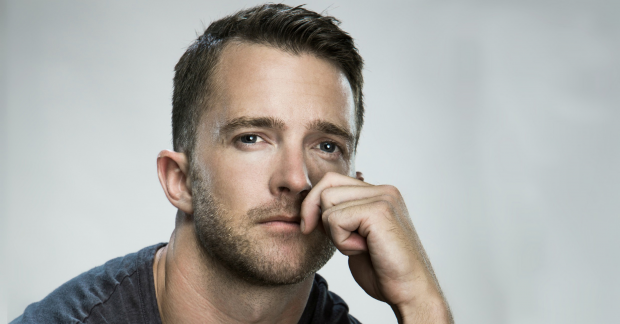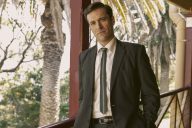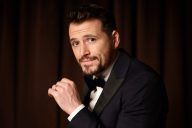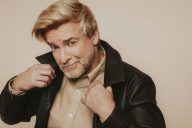1950’s melodrama A Place To Call Home continues to build fans and ratings through its unique storylines, which includes gay characters James Bligh and Dr Henry Fox. Tim Draxl, who plays the suave and sexy doctor, tells Matt Myers about finding his voice in the industry.
You have a great role as doctor Henry Fox. What’s in store this season?
Tim Draxl: There’s a huge development in the relationship between Henry and James Bligh, who’s played by David Berry. It’s really lovely, but there are obstacles that come up along the way. In the first part of the season there’s a focus on my relationship with James, but there is also a turning point where I kind of get into a bit of trouble which changes my character arc quite dramatically. It shifts from the pivotal love story half way through and becomes something entirely different that carries through to the final episode. It has an effect on my relationship with everyone, but mostly with James.
Do things get hot and heavy, like in a Queer As Folk way?
A Queer As Folk way?
Do they have sex?
(Laughing) To put it bluntly! Yes, but I mean the relationship was kind of solidified by the end of season three, where it became physical. So that continues, not on-screen, but it is certainly a real relationship between two men. But gay characters on screen are certainly more mainstream now and I can’t think of many shows that don’t have some kind of a gay storyline, but I think the creator Bevan Lee was specific that the relationship between James and Henry would not be based on sex. It’s not that he’s shying away from making a statement, but the focal point is about them having a relationship. The fact that they’re two men is kind of almost secondary.
Your co-star David Berry also did an interview for DNA. How do you find working together?
David and I have had many coffees and meetings outside of work to discuss how to portray these characters and how we wanted the relationship to appear on camera. I think the most important and reoccurring topic of conversation for us, was that we wanted there to be chemistry between the two, and to make it as real as possible. They are essentially two men who are in love with each other, in the Fifties in a time where it was totally not accepted socially or otherwise. So it’s important to have that through-line of genuine love and affection for each other.
As an openly-gay actor, how do you feel about the storylines tackled in the show?
It’s a topic that is very current and relevant, and with playing this role in a Fifties setting…the magnitude of what that meant back then, just can’t be overlooked. For a gay man in the Fifties, the stakes were so high and especially for a character like Henry who is a very well regarded Sydney surgeon. To be found out as gay was detrimental with jail time and loss of license. It would have absolutely destroyed him. In fact, Bevan gave us some great reference points and one was the story of Lord Montagu of Beaulieu who went though several court hearings in London and was a member of the realm, but was jailed for his homosexuality. He was married and then became the founder of the National Motors Club in England, a very high profile figure. It’s kind of used in our storyline and referred to by my character when things start to get a bit rocky. Henry is very comfortable with his sexuality and is even asked to instill that knowledge onto James by his family. But is then gets kind of swung around where he becomes the student and is learning again how to navigate his way around a world where his kind are not accepted. It’s important for everyone to remember how high the stakes were back then. It’s obviously a different world now, yet we still have so far to go.
Have you heard the comparisons of A Place To Call Home to Dynasty?
No, I’ve heard the comparison to Downton Abbey, but not Dynasty.
When you think of it, there is a ‘dynasty’ of wealthy people living in an old mansion with a scheming Alexis character, a good girl like Krystle and even the gay son like Steven
Funny enough I’ve never watched Dynasty, but many years ago I did work on the behind-the-scenes telefilm, Dynasty: The Making of a Guilty Pleasure. That was great fun to work on. I played a young studio executive named Joe!
In regards to the acting world, do you think the days of actors staying closeted to secure roles has finally passed?
Absolutely. I think being gay now, as an actor, is almost a positive. I guess because it’s so topical now and to be gay is, in a way, so celebrated. Certainly in our industry, the stigmas have slowly been broken down, and there are more and more gay actors playing all kinds of roles. I think it’s got a lot to do with not making a big fuss about it and it to accept with whether we are gay, straight, bi, transgender and all those things. We’re all human and the less we use those labels the healthier it is to get over the prejudices that are attached. My idea of a perfect world is where those labels are abandoned.
Would it be fair to say that Swimming Upstream (2003) was the breakthrough for you?
That was certainly my real breakthrough into the acting world, but it’s been a very-up-and-down rollercoaster ride. Back then I was nineteen, and you do kind of have this naïve mentality of ‘I’ve made it now, this is my big break’ but out of that came the shark net, where it kind of ebbs and flows. You just kind of keep plodding along and taking the roles that are offered and interest you.
A Few Best Men (2007) looked like it would have been a great experience
That was probably the most fun job I’ve ever had. It was certainly the most fun I’ve ever had on set. But again, it came at a time in my life – and I think one of the reasons director Stephan Elliott put me in that role – was because I’d just moved back from Los Angeles at the end of 2010, and was going through a considerable depression. I think it was out of that depression that Stephan thought he could use it for the character that is very depressed. So in some ways when I look back on that role, I wish I could have another go at it, because when you’re depressed it hinders you creatively and really stunts your inspiration. When I look now there were so many choices in the scrip that I missed out on, because I was so clouded. I’d been in LA for five years and lived through the writers’ strike! There had been no work and it was the first time I had to get a day-job in LA. It was a hard time, but that film really helped me get out of a rut.
Any special memories from that movie?
It was never ending on that show with Kris Marshall (Death in Paradise) and Kevin Bishop (Benidorm). With both being comedians, there was this wonderful rivalry between them, like who could top the other in being more outrageous. I remember one particularly drunk night we were filming up in Katoomba and we ended up down at the Three Sisters in the early hours of the morning drinking and worrying that we would get caught.
Err…not a place to be crawling around drunk!
(Laughing) No, but we were invincible! I also broke a tooth on that set and I made out with an eighty-year-old woman!
What the…?
There’s a very quick moment in the film where I’m drunk and make out with one of the guests, and I think the original script was different. So the night before we were meant to shoot the scene Stef called me at two o’clock in the morning and said “Drax, I’ve got a great idea! How do you feel about making out with an eighty year old woman?” I was like “If you think it’s going to be funny, then by all means.” The next day this beautiful eighty-year-old from Katoomba, who was from the world of radio plays, was there and beaming. Of course also happened to be the day my mother was visiting on set!
You also played Molly’s lover Karl, in the Ian Meldrum mini-series Molly. How did you prepare for that role?
Yes, I had a very gay year last year. I played Molly’s lover, I did A Place To Call Home and Mothers and Sons at the Ensemble theatre where I played Jason Langley’s husband. But I never actually got to meet Molly. I found out about the job while I was in Bali and didn’t get to do a lot of prep for the role, but it was one that didn’t require too much. It was an interesting in that it was initially based on a real person and by the time I had got it, the character’s name was changed for legal reasons.
What was the Hollywood experience like for you?
For me it was kind of bittersweet. I started going to LA when I was quite young at like seventeen and I recorded my second album in LA at Capital Records, which was a foot in the door. There was a lot of promise and excitement in those early years, but it was a very different place then to what it is now. There was a much greater enthusiasm for new actors and certainly for Australian talent. Not to say there isn’t now, but back then Australians were a relatively new flavour and sinking their teeth into it. I think my mistake was that I kept coming and going, because I kept getting work in Australia too. So when I moved over in 2006 and became one of the millions of other actors living in LA, waiting for their breakthrough, it became a very different war game and mindset. It was a constant struggle trying to maintain optimism and not to feel like a part of the rat race. It was also hard trying to maintain inspiration and hold onto your initial dreams and aspirations. I did about four films and one pilot and then the writers’ strike happened and the industry just completely fell apart. I remember going for auditions at Paramount Studios and literally crossing the picket line, which was horrendous, but it went from a situation where they were so eager to find new talent and willing to take risks in an industry that was so petrified of losing more money.
What was your best experience working in the States?
The best experience creatively, was a film I did called Ivory which had a very limited release in America and ended up being a bit of a dog’s breakfast. But I got to work with the Polish actor Peter Stormare from Fargo and Dancer in the Dark. It was a story about an aspiring concert pianist, so in preparation we had two months of piano training and I studied with an Israeli concert pianist called Yossi Rasda. It was very ‘LA’ and they shifted grand pianos into our apartments and we had four to six hours a day with Yossi constantly studying. We also shot in amazing places like Oklahoma and Budapest, but creatively it opened up a whole new world of classical music and opera to me. It was one of those situations where from beginning to end, something broke down in communications between, producers, director and creative teams and as a result the vision from the beginning was not was on film in the end. Which was a shame as it was a great story and one that had not been told about the concert pianist competition circuit.
Your singing voice is quite beautiful, even hypnotic. Any chance of a new album?
Funny you should ask because I was recently sitting at the Hydro Majestic at Katoomba and started thinking about recording again. I’m still touring with the Chet Baker show, which we are doing at the Auckland Festival at the end of September. That came about in 2010 and it’s been evolving ever since. It’s a nice compact show that travels well, with four musicians and myself. We do a lot of the festivals, which is great because it gives me an opportunity to sing, and because of my acting, I haven’t had as much time to invest in that.
Who are your favourite musical artists?
A lot of different people and currently I’m listening to flamenco music. I had three weeks off from filming, and I thought fuck it, I’m not wasting this opportunity, so I went to Portugal. Wherever I am, I like to listen to local music, and when I went to Barcelona I discovered flamenco music. I’d heard it before, but until you hear it live…I mean the percussion in the music is just unbelievable. I also like all the old standards of Nina Simone, Ella Fitzgerald, Sarah Vaughan, Tony Bennett and Sinatra.
So who is your diva?
Right now I wouldn’t call myself a huge Beyoncé fan, but the song Daddy Lessons is right up there. I’ve been riding around listening to it and it fits very well. In fact there’s a line where she says “playing black jack, listening to vinyl and riding motorbikes”. Not that I should be listening while riding!
Who has been the biggest influence on your career?
One of the most influential people has been Geoffrey Rush. Working with him on Swimming Upstream was an incredible experience and I’d also say Peter Matz. I worked with them both at the beginning of my career and when I’m on set and working, I always think of Geoffrey and how he is at work. He has such a great sense of humour. He’s a very focused and dedicated actor but he has fun doing what he does. He has a very contagious love of the art of acting, and that sets a tone, which is important for actors. You hear a lot of stories about difficult actors, but Geoffrey is the complete antithesis of that. He’s one of the most generous, loving and down to earth men I’ve ever met. The way he conducts himself with every single person on set from crew to cast and producers, he treats everyone with the same amount of respect. Peter Matz is no longer with us. He was an American musician who passed away just after I had done my second album, which he conducted. He taught me to listen to and trust my instincts – to go with your gut.
Back in 2000 you played Rolf in The Sound of Music, and you’re actually Austrian!
Yes, that was certainly a talking point and the publicity department from John Frost’s office loved publicising the fact that I was seventeen going on eighteen and in fact Austrian. That was the first time in history that that had actually happened!
Tell us something people don’t know about Tim Draxl
I’m a bit of an adventurer, I like skydiving, scuba diving and motorbike riding. But it’s only been in like the last couple of years and certainly travel adventures have taken over a lot of my focus. I love what travel does to you, in how it changes perspectives. I try to travel as much as I can and wherever I can.
A Place To Call Home screens Sundays 8.30pm on Foxtel






No Comments